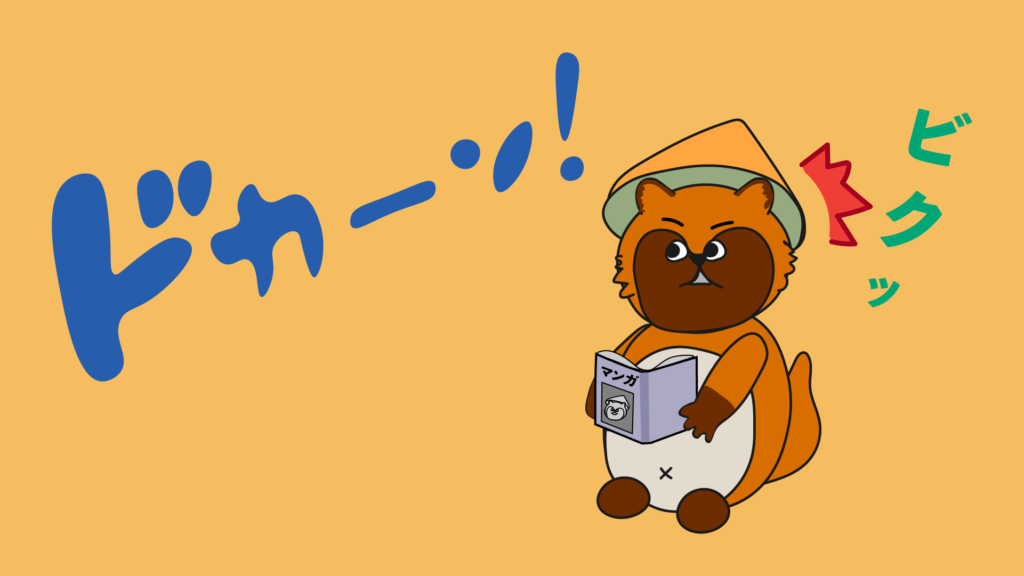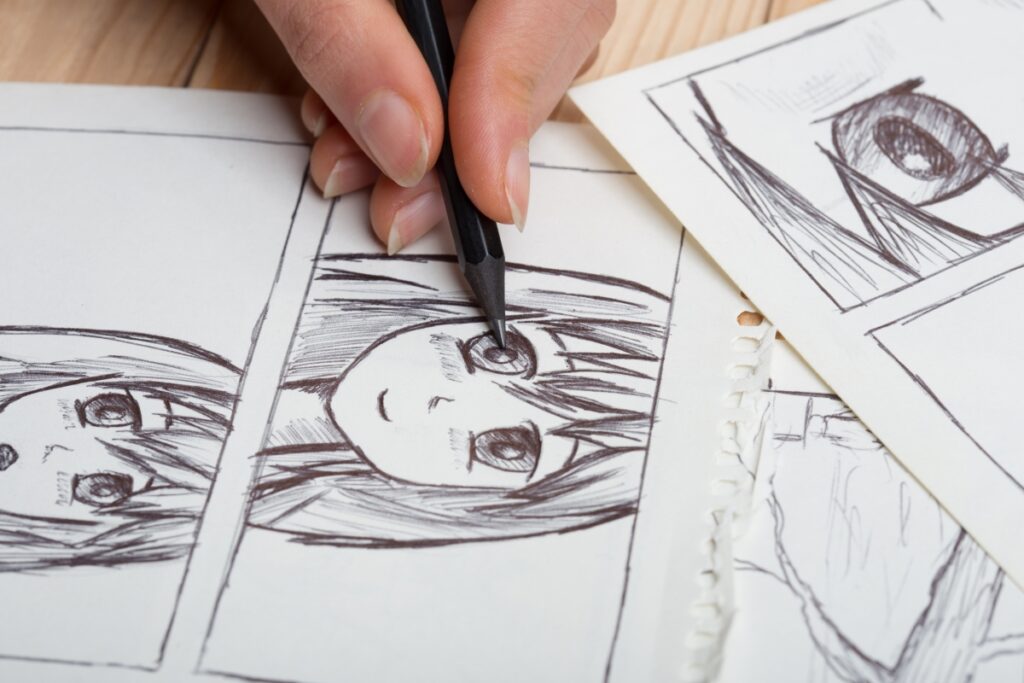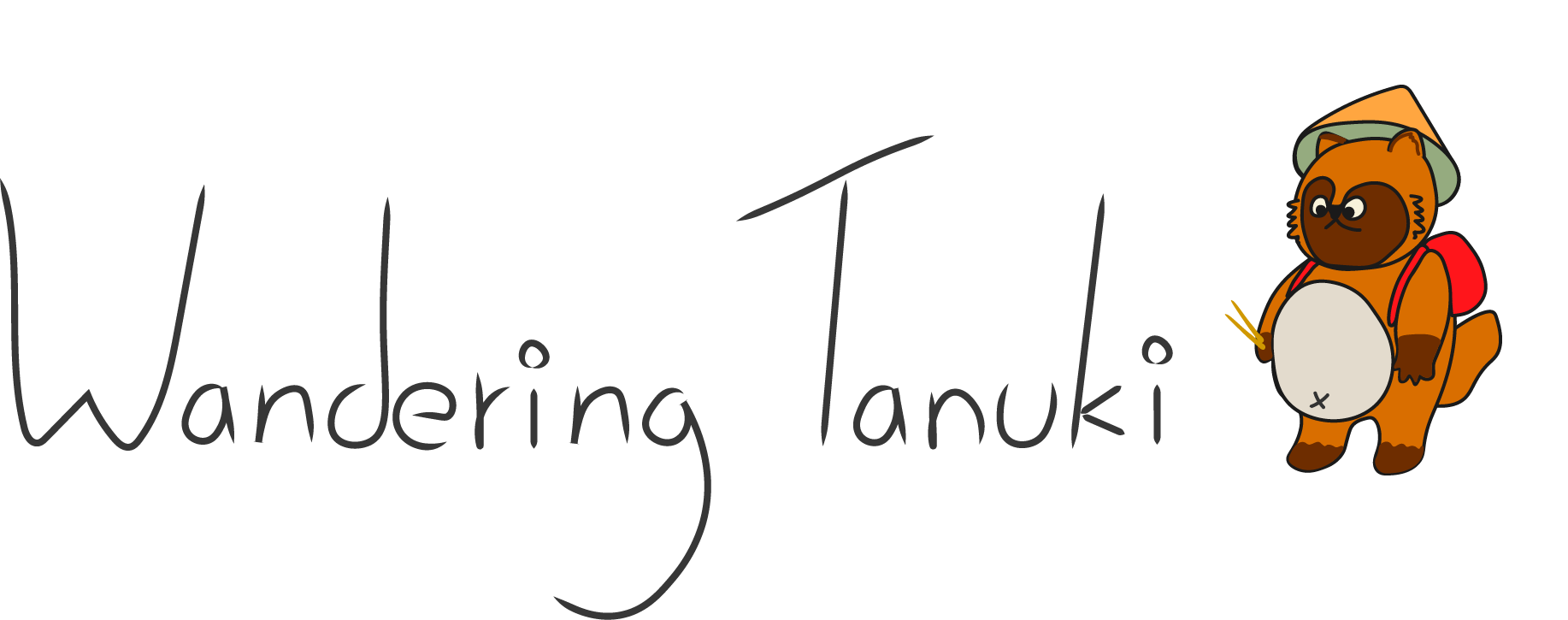Manga Onomatopoeia: Sound Effects!
As you’re reading manga, have you noticed the words in the background of the illustrations? Those are Japanese onomatopoeia, or sound effects. In English, “bang” or “boom” would be an example.

Even in some translations, they will keep these sound effects because they form part of the artwork. Sound effects or onomatopoeia are extremely important in Japanese language! It can describe everything from actual sounds to feelings.
Here are some common manga onomatopoeia or sound effects you might encounter. Keep in mind that there are many variations on these sounds. You might not see the exact same one but slightly altered.
Loud sound effects
Manga will often use loud sound effect words to elevate the action. These will also be printed in big font and are common in a battle scene!
ドッカン – dokkan
Explosion sounds or the sound when someone fires a cannon.
ドーン – doon
Loud sound that can be an explosion or something heavy falling to the ground.
ドブーン – dobuun
A big object or person falling into the water.
グサッ – gusa
A loud stabbing sound.
ゴゴゴゴ – gogogogo
The sound of fast flowing water or engine whirring.
ガチャン – gachan
The sound of heavy machinery “clanking” together.
バッシャン – basshan
Splash sound of something going into the water. Less heavy than dobuun.
Footstep sound effects
There are many ways to make footsteps come to life with words. Here are some of the sounds you might find when a character is walking or running.
ドタドタ – dota dota
Really heavy and clumsy footsteps.
ギシッ – gishi
The wood creaking beneath someone’s foot.
スタスタ – suta suta
Sound when walking easily and quickly.
グチャ – gucha
When stepping into something sticky or squishy like mud.
タタタタ – tatatata
Fast running sound on a hard surface.
ザザザ – za za za
Running through grass or bushes.
Weather/atmosphere sounds
What makes manga so vivid, is the way that the scenes are set. These sounds create a way for the reader to imagine the background noises during different seasons, weather, and locations.
ザーザー – zaa zaa
Sound of heavy continuous rain.
ポツポツ – potsu potsu
Light rain droplet sounds.
ザワザワ – zawa zawa
Rustling of trees or grass from the wind.
ビュービュー – byuu byuu
Strong and fast wind.
ジメジメ – jime jime
Wet and humid air. It can also apply to damp clothing.
ミーンミーン – miin miin
The sound of cicadas, a common atmosphere sound during the summer.
シーン – shiin
A sound that represents silence.
Feeling/people sounds
This may be the hardest to relate, from an English speaker’s perspective. Japanese people have tied together emotions and feelings into sound effects.
キョトン – kyoton
Feeling confused and a bit lost.
ドキドキ – doki doki
Feeling excited and a bit nervous. The sound is like the heart beat.
ワクワク – waku waku
Excited and looking forward to something.
ビクビク – biku biku
Scared and easily startled.
デレー – deree
Feeling extremely lazy and don’t want to get up to do anything.
キョロキョロ – kyoro kyoro
Looking around curiously.
イライラ – ira ira
Annoyed and angry.
ハックション – hakkushon
Sneeze sound.
グーグー – guu guu
Snoring really loudly.
スースー – suu suu
Breathing quietly while sleeping peacefully.
バーン – baan
Showing something off, kind of like “ta-da”.
テレテレ – tere tere
Being embarrassed and shy.
ブルブル – buru buru
Shivering sounds.
ニヤニヤ – niya niya
Grinning about something.
Food sounds
Some manga incorporate food scenes, especially if it is a food manga. In those, you might see some of these sounds.
ポリポリ – pori pori
Eating something loudly like chips.
ジュー – jyuu
The sound of food being cooked, especially meats.
ガリッ – gari
Biting something hard like a popsicle.
バクバク – baku baku
Eating quickly.
モグモグ – mogu mogu
Chewing sounds.
ガブガブ – gabu gabu
Drinking something quickly or biting something big.

I hope this article will give you a small taste of manga onomatopoeia or sound effects! This should help you to understand and enjoy manga even more. If you’re interested in other Japanese language learning blog content be sure to check out How to Say Yes and No in Japanese or How to order food at a restaurant in Japanese
~ Tanuki





